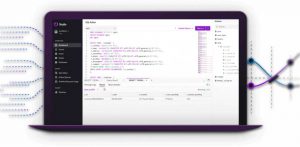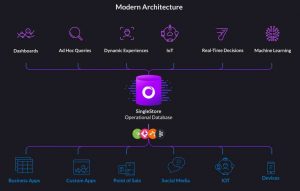SingleStore Hybrid Multi-Cloud, Unified Analytical and Transactional Database
Solution separates storage and compute, and offers system-of-record capabilities.
This is a Press Release edited by StorageNewsletter.com on June 28, 2021 at 2:32 pmSingleStore, Inc. announced the database that addresses both analytical and transactional workloads for the multi-cloud world.
Click to enlarge
The users can scale their applications flexibly and cost effectively without compromising on performance. This marks a watershed moment for the database industry, which has historically architected databases for analytical or transactional workloads.
“Never before has a company architected a database for both analytics and transactional workloads — and without compromising on performance, efficiency or flexibility,” said Raj Verma, CEO. “SingleStore provides the world’s only highly performant, hybrid multi-cloud database that unifies analytical and transactional workloads. In introducing this, we’ve created a new category that will define the future of databases and data platforms.“
Click to enlarge
Key SingleStore product announcements include:
-
Separation of storage and compute, which is available in data warehouses but has never before been available in a unified database that supports both transactional and analytical workloads;
-
Point-In-Time Recovery (PITR), which enables system-of-record capability; and
-
Universal storage with multicolumn key support, so customers no longer need separate operational and analytical systems, and developers don’t have to dedicate valuable time to extracting, transforming, and loading (ETL) to a data warehouse to perform analytics. A unified platform also makes queries run faster, decreases complexity, and provides a better price:performance ratio.
“Separation of storage and compute enables data-intensive workloads to scale in a cost-effective way while delivering the extreme performance SingleStore is known for,” said Jordan Tigani, chief product officer. “PITR enables system-of-record capability, allowing users to run their businesses on SingleStore with confidence. Universal storage is the last step in realizing the vision of a single database that supports both analytical and transactional workloads in one place. Now developers can add analytics to their applications, and data engineers can keep up with rapidly changing data using SingleStore. Having a unified platform is also faster, more efficient, flexible, and easy to manage for our customers.“
The solution is available as a managed service on any major cloud service provider and available for self-hosted use. SingleStore Managed Service users can subscribe to monthly credit bundles and consume them as needed for dynamic workloads. Now they can avoid worrying about accurately sizing their clusters. Users also can benefit from discounts for prepaying, but without getting locked into a use-it-or-lose-it model. These options provide to users with more control, flexibility and predictability.
“Most organizations want to utilize a single analytical data infrastructure (ADI) platform to support multiple business intelligence and analytics use cases and workloads, with a focus on core use cases of reporting, dashboards, and data discovery/exploration,” said Howard Dresner, founder and chief research officer, Dresner Advisory Services. “The majority of business function respondents prefer an ADI platform accessed and licensed via a cloud deployment.“











 Subscribe to our free daily newsletter
Subscribe to our free daily newsletter

